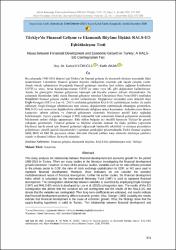| dc.contributor.author | Eyüboğlu, Kemal | |
| dc.contributor.author | Akan, Kadir | |
| dc.date.accessioned | 2021-09-30T12:23:36Z | |
| dc.date.available | 2021-09-30T12:23:36Z | |
| dc.date.issued | 31.12.2020 | en_US |
| dc.identifier.citation | Eyüboğlu, K. & Akan, K. (2020). Türkiye’de Finansal Gelişme ve Ekonomik Büyüme İlişkisi: RALS-EG Eşbütünleşme Testi . Afyon Kocatepe Üniversitesi Sosyal Bilimler Dergisi , 22 (4) , 974-988 . DOI: 10.32709/akusosbil.627788 | en_US |
| dc.identifier.uri | https://dergipark.org.tr/tr/pub/akusosbil/issue/59165/627788 | |
| dc.identifier.uri | https://hdl.handle.net/11630/9310 | |
| dc.description.abstract | Bu çalışmada 1980-2016 dönemi için Türkiye’de finansal gelişme ile ekonomik büyüme arasındaki ilişki
araştırılmıştır. Literatürde finansal gelişme büyüme etkileşimini araştıran çok sayıda çalışma vardır.
Ancak önceki çalışmaların birçoğunda finansal gelişmeyi temsilen özel sektöre sağlanan kredilerinin
GSYH’ye oranı, borsa kapitalizasyonunun GSYH’ye oranı veya M2 gibi değişkenler kullanılmıştır.
Ancak, bu göstergeler finansal gelişmenin karmaşık çok boyutlu yapısını dikkate almamaktadır. Bu
çalışmada literatürden farklı olarak finansal gelişmeyi temsilen Uluslararası Para Fonu (IMF) tarafından
hesaplanan finansal gelişme endeksi verileri kullanılmıştır. Değişkenler arasındaki uzun dönemli ilişki
Engle-Granger (1987) ve Lee vd. (2015) tarafından geliştirilen RALS-EG eşbütünleşme testleri ile analiz
edilmiştir. Engle-Granger eşbütünleşme testi sonucu, değişkenlerin eşbütünleşik olmadığını gösterirken,
RALS-EG testi sonucu ise değişkenlerin eşbütünleşik olduğunu ortaya koymuştur. Ardından uzun dönem
katsayıları tahmin edilmiş ve finansal gelişmenin ekonomik büyümeye pozitif katkı sağladığı
belirlenmiştir. Ayrıca yapılan Granger (1969) nedensellik testi sonucunda finansal gelişmenin ekonomik
büyümenin nedeni olduğu saptanmıştır. Elde edilen bulgular arz öncüllü hipotezin Türkiye’de geçerli
olduğunu göstermiştir. Finansal gelişme ve büyüme arasında bulunan bu ilişki, politika yapıcıların
büyümeyi teşvik etmek için finansal gelişmeyi sağlayacak bankacılık sektörünü ve sermaye piyasalarını
geliştirmeye yönelik gerekli düzenlemeleri yapmaları gerektiğini göstermektedir. Farklı finansal araçlara
sahip derin ve likit bir piyasanın olması ülkelerin finansal şoklara karşı direncini artırmaya yardımcı
olacak ve finansal istikrarı da teşvik edecektir. | en_US |
| dc.description.abstract | This study analyzes the relationship between financial development and economic growth for the period
1980-2016 in Turkey. There are many studies in the literature investigating the financial development
growth interaction. However, in most of the previous studies, variables such as the ratio of loans provided
to the private sector to GDP, the ratio of stock exchange capitalization to GDP, or M2 were used to
represent financial development. However, these indicators do not consider the complex
multidimensional nature of financial development. Unlike the earlier studies, the financial development
index which is calculated by the International Monetary Fund (IMF) is used to represent financial
development. The cointegration relationship between variables is examined by employing Engle-Granger
(1987) and RALS-EG which is developed by Lee et al. (2015) cointegration tests. The results of the EG
cointegration test denote that the variables are not cointegrated and the results of the RALS-EG test
denote that the variables are cointegrated. Then long-term coefficients are estimated, and results indicate
that financial development positively affects economic growth. Also, Granger (1969) causality test results
indicate that financial development is the cause of economic growth. Thus, the findings show that the
supply-leading hypothesis is valid in Turkey. This relationship between financial development and growth shows that policymakers need to make the necessary regulations to develop the banking sector
and capital markets that will provide financial development to encourage growth. Having a deep and
liquid market with different financial instruments will help countries increase their resilience to financial
shocks and will also promote financial stability. | en_US |
| dc.language.iso | tr | |
| dc.publisher | Afyon Kocatepe Üniversitesi | en_US |
| dc.relation.ispartof | Afyon Kocatepe Üniversitesi Sosyal Bilimler Dergisi | |
| dc.identifier.doi | 10.32709/akusosbil.627788 | |
| dc.rights | info:eu-repo/semantics/openAccess | en_US |
| dc.subject | Finansal gelişme | en_US |
| dc.subject | Ekonomik büyüme | en_US |
| dc.subject | RALS-EG eşbütünleşme testi | en_US |
| dc.subject | Türkiye | en_US |
| dc.title | Türkiye’de finansal gelişme ve ekonomik büyüme ilişkisi: RALS-EG eşbütünleşme testi | en_US |
| dc.title.alternative | Nexus between financial development and economic growth in Turkey: a RALS-EG cointegration test | en_US |
| dc.type | Article | |
| dc.department | Seçiniz | en_US |
| dc.identifier.orcid | 0000-0002-2108-9732 | en_US |
| dc.identifier.orcid | 0000-0001-5133-0032 | en_US |
| dc.identifier.volume | 22 | en_US |
| dc.identifier.startpage | 974 | en_US |
| dc.identifier.endpage | 988 | en_US |
| dc.identifier.issue | 4 | en_US |
| dc.relation.publicationcategory | Makale - Ulusal Hakemli Dergi - Başka Kurum Yazarı | en_US |



















